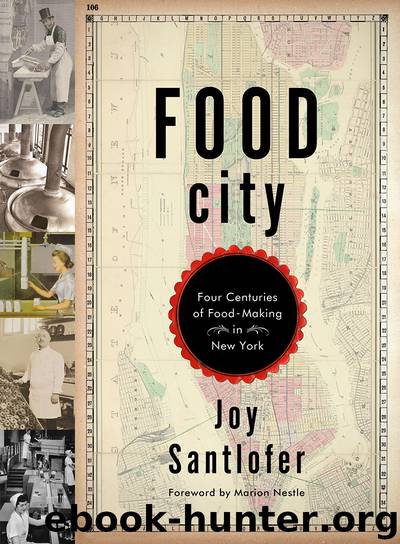Food City by Joy Santlofer

Author:Joy Santlofer
Language: eng
Format: epub
Publisher: W. W. Norton & Company
Pauline’s attitude obviously changed by 1908, when she sued to receive her fair share of the estate and to remove her mother from management of the brewery, where most of the profits went to pay Josephine’s $500,000 salary as treasurer. During the trial, which lasted for almost a year, fifty-five-year-old Josephine married in a quiet ceremony in Brooklyn. The groom, Don Giovanni Del Drago, who claimed to be twenty-seven and an Italian prince, was actually forty-seven, twice divorced, and had a twenty-year-old son in Switzerland, and he was no prince. Four days after her wedding Josephine settled the lawsuit, agreeing to step down as treasurer but not as president. Pauline now became a director of the brewery.
JEWISH MOONSHINE
In the early years of the twentieth century, plebian New Yorkers were making money from making booze. While beer drinking continued to grow at the expense of hard liquor, there was still a market for the cheap, illegal version. Moonshiners are often pictured as rifle-toting, bearded mountain men, but distilling illegal beverages was more widespread and profitable in the canyons of New York than in the hills of West Virginia. Most city raids were completed without gunshots or bloodshed, and the pragmatic city distiller, who knew he would soon be back in business, paid his fine or did his (short) time. Even though New York had a large contingent of revenue officers, they were the first to concede that “there was little hope of suppressing the illicit distilling in New York” as long as it turned a dollar.
In poorer neighborhoods, stills were often found in tenements, usually near a saloon where the product (and evidence) could quickly be quaffed. One ingenious Lower East Side setup impressed even the jaded revenue agents who had long searched for it. A trapdoor behind the bar in a saloon led to a ladder into an underground passageway. Deep beneath the streets was a block-long labyrinth of rooms full of stored liquor casks, and 100 feet down the path was the still . . . under a synagogue. The congregants of First United Podhaycer, which had opened in 1903 at 126 Rivington Street, worshipped right over this underground still. On the building’s ground floor was Sam Schapiro’s legal winery.
Schapiro had arrived from the Austro-Hungarian Empire in the late 1800s and by 1899 began producing kosher wine as a sideline for his restaurant on Attorney Street, where diners were served a free glass of mead, or honey wine. On the days before the Jewish holidays, people lined up to buy the wine, which his ads described as “so thick you can cut it with a knife.” Concord grapes from upstate were crushed in the shop and fermented under the supervision of a rabbi. Belowground, either Schapiro or someone with his blessing was making well-crafted whiskey. The moonshiner was probably a Russian Jewish immigrant, since Jews had operated about 89 percent of Russia’s distilleries in the 1870s, drink being one of the few areas where they could legally work. In the 1920s Schapiro’s family reminisced that he sold “the good stuff” out of his back room.
Download
This site does not store any files on its server. We only index and link to content provided by other sites. Please contact the content providers to delete copyright contents if any and email us, we'll remove relevant links or contents immediately.
| African Americans | Civil War |
| Colonial Period | Immigrants |
| Revolution & Founding | State & Local |
Cat's cradle by Kurt Vonnegut(13930)
Pimp by Iceberg Slim(12972)
Underground: A Human History of the Worlds Beneath Our Feet by Will Hunt(11289)
4 3 2 1: A Novel by Paul Auster(11100)
The Radium Girls by Kate Moore(10943)
American History Stories, Volume III (Yesterday's Classics) by Pratt Mara L(4832)
Perfect Rhythm by Jae(4641)
Wiseguy by Nicholas Pileggi(4631)
The Fire Next Time by James Baldwin(4369)
Paper Towns by Green John(4191)
A Higher Loyalty: Truth, Lies, and Leadership by James Comey(4055)
Pale Blue Dot by Carl Sagan(4036)
The Mayflower and the Pilgrims' New World by Nathaniel Philbrick(3929)
The Doomsday Machine by Daniel Ellsberg(3753)
Too Much and Not the Mood by Durga Chew-Bose(3708)
Killers of the Flower Moon: The Osage Murders and the Birth of the FBI by David Grann(3656)
The Borden Murders by Sarah Miller(3602)
The Sympathizer by Viet Thanh Nguyen(3545)
Killing England by Bill O'Reilly(3476)
